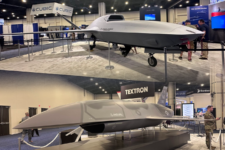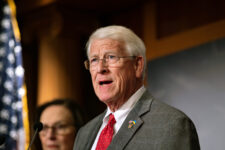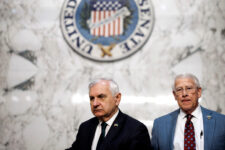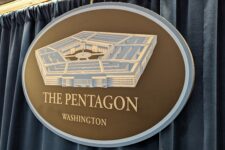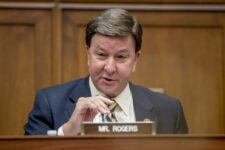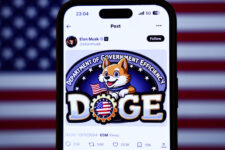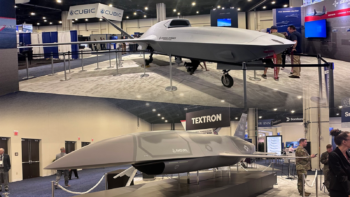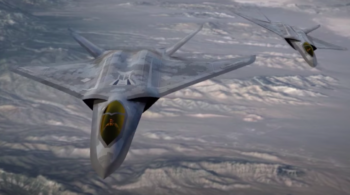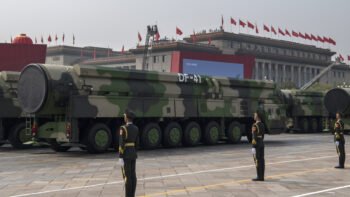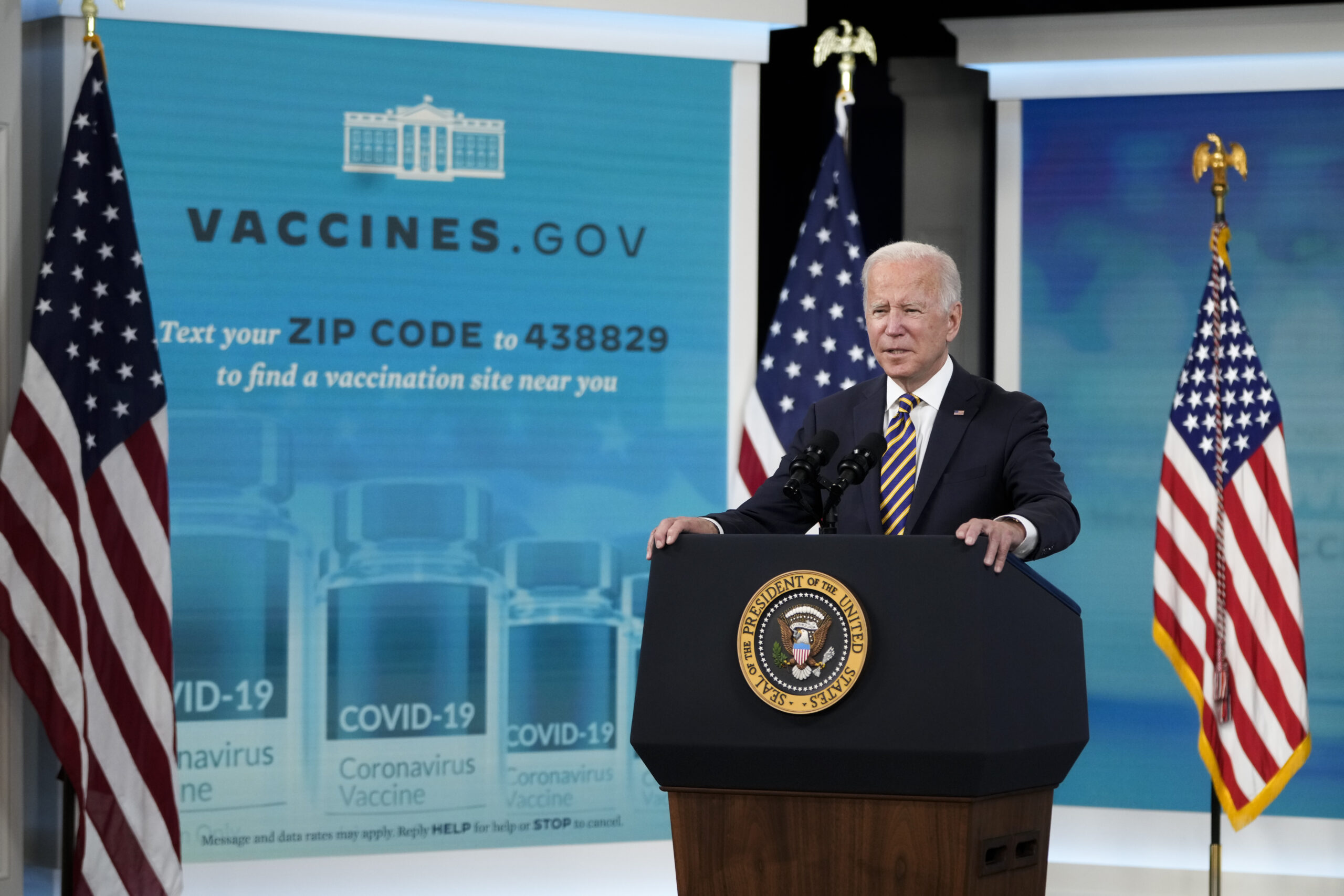
President Joe Biden’s vaccination mandate could cause workers to leave their jobs. (Drew Angerer/Getty Images)
WASHINGTON: With little more than a month left to meet the Biden administration’s Dec. 8 coronavirus vaccination mandate, defense contractors are bracing for the loss of a portion of its workforce.
Some of America’s top defense firms, like Northrop Grumman and Raytheon, are already taking steps to fend off a disruption of work that could impact their bottom line, top executives said this week.
“We are proactively increasing our hiring now, in anticipation that we may have some loss of workers,” Northrop Grumman CEO Kathy Warden told investors during an Oct. 28 earnings call. “And we are ensuring that we have training and skill building programs in place, so as we bring those new employees into the workplace, they can get productive and efficient as quickly as possible.”
Raytheon Technologies is also hiring additional workers, hoping to mitigate the expected loss of “several thousand” of its 125,000 employees, its CEO Greg Hayes told CNBC on Tuesday.
Warden said that the “vast majority” of Northrop employees are vaccinated or are in the process of getting vaccinated. However, the company won’t know the ultimate fallout of the mandate on its business until it understands with more certainty how many workers will be terminated — and what expertise could be leaving the defense sector forever.
Warden echoed concerns from other CEOs this week that workers may choose to exit the industry rather than get vaccinated, taking with them decades of experience in areas like engineering or machining. And while a mass walkout of workers would obviously have an impact on defense programs, it’s too early to know which weapon systems could face increases in cost or schedule delays.
So far, 83% of Raytheon employees have been vaccinated, with 6% currently going through the vaccination process and 3% planning to seek a religious or health accommodation, Hayes said, according to Reuters.
However, another 3% of workers have stated that they do not plan on getting vaccinated, Hayes added.
CACI International, one of the government’s biggest IT providers, is trending toward a 90 percent vaccination rate, said its president and CEO John Mengucci on Thursday.
But while that’s a “positive” sign, Mengucci expressed some exasperation with the implementation of the mandate, saying that his company has had to work through “hourly changes” to the policy as interpreted by various federal agencies.
“Different customers are reacting differently to this mandate that working with them to address safety first, access to government facilities, and ensure continuity of operations,” Mengucci said in an earnings call. Still, “we don’t think the intention of that executive order is to disrupt mission critical activities, or displace skilled and cleared workers in an extremely tight labor market.”
When asked by an investor how much of Booz Allen Hamilton’s workforce still needed to get the vaccine, CEO Horacio Rozanski did not provide figures, but stated that the company’s goal was to get 100 percent of its workforce vaccinated.
“This has been a subject of rich internal conversation,” he said in an earnings call today. “I personally held a couple of town halls, the last one had several thousand people attending, where we talked about and took questions, and had a very open and frank discussion, which was challenging at times.”
‘Noise Up Front and Compliance in the Back’
When President Joe Biden signed the Sept. 9 executive order that put in place a Dec. 8 deadline for federal contractors to get vaccinated, defense and aerospace industry associations went to work. Their goal: to decode guidance from disparate federal agencies, answer questions about implementation and convey overarching concerns about the ripple effects to the supply chain.
But one thing that looks clear, sources said, is that the mandate is not going away.
Arnold Punaro, who chairs the National Defense Industrial Association board, told members in an Oct. 15 message that the the Biden administration has signaled its willing to risk defense companies losing unvaccinated employees.
“They believe from their data that there will be ‘noise up front and compliance in the back’ as this directive is implemented,” he said.
NDIA has not come forward either for or against the vaccine mandate, said Wes Hallman, the organization’s senior vice president for strategy and policy. Rather, the group is trying to make the case for greater flexibility in implementing the policy and has requested guidance on equitable adjustments for any cost increases or schedule delays to contracts as a result of employee losses.
That impact could be especially sizable for small defense businesses.
“These companies don’t have a lot of wiggle room or maneuver space in their employee pool,” Hallman told Breaking Defense in an interview today. “They have specific employees that have specific skillsets and specific security clearances to perform on contract. So even if they lose onesies and twosies, that’s gonna have a real impact on their ability to deliver on contracts and in some cases, may prevent them from delivering on contracts.
The Aerospace Industries Association — which represents both the commercial and defense aviation industries — released an Oct. 11 statement confirming that its member companies planned to conform to the mandate.
“America’s aerospace and defense industry stands together as we prepare to implement the new federal vaccine requirement, while working with our government partners as they develop detailed guidance,” it stated.
While defense executives and industry associations have been careful not to anger the administration by laying out any direct opposition to the mandate, Republicans on Capitol Hill have come out in force against it.
A group of 11 GOP House members — including Alabama Rep. Mike Rogers, the top Republican on the House Armed Services Committee — urged the administration to reconsider implementing the vaccine mandate in an Oct. 22 letter.
“We will lose critical experience in skilled labor,” they wrote. “We will lose opportunities for mentorship and on-the-job training from veteran craftsmen. In the long-term, we will miss quality control standards. We will face endemic cost overruns and rework as decades of lessons are not passed to the next generation.”
The lawmakers added a foreboding warning that, if weapons programs exceed cost and schedule estimates when seasoned workers leave defense companies, Congress will hold the Pentagon responsible.
“If a contractor loses key members of its workforce due to a post-negotiation customer demand, the customer is to blame,” they wrote. “The Department of Defense is the customer and will ultimately be at fault when the industrial base falters at a crucial turning point in our deterrence of China.”
Sen. Tommy Tuberville, (R-Ala.), has requested that the Senate Armed Services Committee hold a hearing on the vaccine mandate’s impact on national security, citing potential impacts to small companies.
“Small business remains the backbone of American enterprise and the ingenuity machine in our competition with China,” he wrote in an Oct. 27 letter to SASC chairman Sen. Jack Reed, (D-N.H.). “We cannot afford to slow them down.”
Jeffrey Zients, the White House’s coronavirus response coordinator, suggested that there may be a grace period for federal contractors who choose not to get vaccinated by the Dec. 8 deadline.
“Those deadlines are not cliffs,” he said during a Oct. 27 briefing. “Once we hit those deadlines, we expect federal agencies and contractors will follow their standard HR processes and that, for any of the probably relatively small percent of employees that are not in compliance, they’ll go through education, counseling, accommodations, and then enforcement.
From Boeing’s struggles to inflation relief funds: 5 industry stories from 2024
Making a year-end list in which she forces references to Taylor Swift songs for no reason has basically become reporter Valerie Insinna’s favorite Christmas tradition.
